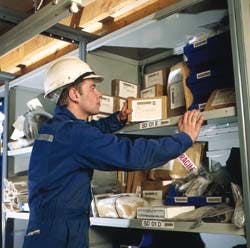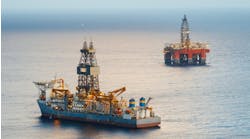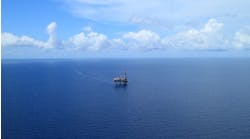John Robertson
EDS UK Energy Division
Just in case may seem a more suitable concept than Just in time when it comes to managing supplies to North Sea oil platforms. Operators cannot risk reducing inventory to the bare minimum, since rough weather may prevent the arrival or unloading of a planned delivery.
Oil companies will go to great lengths to avoid shutting down a platform, except for planned maintenance. With oil priced at $18/bbl and a typical North Sea platform producing about 90,000b/d, profits would rapidly be eroded if they had to cease producing for several days because one essential piece of equipment was missing.
This means they must keep platforms adequately supplied to cover breakdown and delivery delays. However, there is no point tying up unnecessary capital by having too much expensive equipment lie idle on the platform. There is a fine balance to be struck.
The temptation to supply too many items `just in case' can be avoided by using materials management software designed specifically for North Sea offshore operations. By building up a picture of inventory requirements through historical analysis of the individual situation, this software enables operators to reduce holdings to a level which remains cost-effective while ensuring that critical items are available when needed.
As well as the harsh environment, there are other special considerations in logistics and materials management for North Sea offshore operations. For example, the Joint Operating Agreement between the platform operator and other partners in each North Sea field adds a level of complexity which is not dealt with by standard materials management packages.
To satisfy the requirements of these agreements, operators must allocate the requisite proportion of goods or services to each member in a consortium and also allow for the movement of goods between partnerships.
The stringent reporting requirements of Customs and Excise are another unusual feature. Items which are sourced outside the UK may wait in a dockside warehouse before being transported to a platform outside UK waters. The Customs and Excise officer must be able to audit these duty-suspended items if the oil companies are to avoid paying tax on them.
When goods are going by sea, the operator must provide a manifest giving details of every item on deck and in each container for the ship's captain, the Customs officer and dockside staff. Equally detailed records and reports are needed to keep track of stock moved by air or road.
The logistics requirements of each operator are similar. They need to be able to track the movements and status of thousands of items from numerous sources through multiple warehouses, while in transit, and to particular locations on the offshore platform.
They must ensure that the necessary items are made available on time from warehouse stock, from goods in transit or by purchase or rental. Whether goods or services are purchased or rented, buyers must raise purchase orders, often in a variety of currencies: they need information about approved vendors and they need a means of monitoring their performance.
An additional requirement when managing the movement of goods to offshore platforms is the ability to identify and control the whereabouts of inflammable and other wise hazardous materials. Safety is a critical issue.
Any system for logistics use in the North Sea must cater for these special requirements. It must also include the usual core functions of materials management: stock control; stores functions, such as the provision of warehouse picking lists showing values and location of items; and stock analysis and audits.
To help field operators track the movements of thousands of items, IMPALA assigns each item a serial number.
Consortium
EDS designed its IMPALA Inventory Management, Purchasing and Logistics Administration system specifically for use by North Sea operators, working closely with a consortium of oil companies, led by Sun Oil Britain. As a result the system meets the special needs already mentioned and functions at the necessary level of detail, for example providing stock analysis, down to the tracking of individual items by assigning them a serial number.
It also caters for stock inspection and quality analysis, grading stock into five conditions so that companies know the value of their assets from brand new, to items needing repair, to those they are ready to scrap. And it handles efficient administration of repairs.
Agip UK has been using the system since April 1994 and can attest to its usefulness in supporting their operations. The company's General Services Superintendent, Roy Kilgour, says: "There was a steep learning curve at first, but now everyone is familiar with the new working practices and how the system functions. It's a good tool and handles our requirements well."
Although IMPALA provides the same basic functionality for each field, EDS customizes it to suit each operator, for example, making changes for Agip UK to suit its internal business procedures. EDS also integrated IMPALA with MCS-II, the materials maintenance package used by Agip UK, and is now linking it with Sitra, the accounting and financial software it uses.
EDS provided initial training for the company's core users. Kilgour says: "The system affects all areas of the business so everyone in the company needed to learn to use at least some aspect of it. We found it most useful to have a few members of staff who understand IMPALA well and know the individual requirements of each user. Then we can continue the training ourselves and run refresher courses when we need them."
IMPALA is now used by different operators at six UK North Sea fields: Nelson, Tiffany, Balmoral, Markham, Ravenspurn, and Esmond.
Copyright 1995 Offshore. All Rights Reserved.




